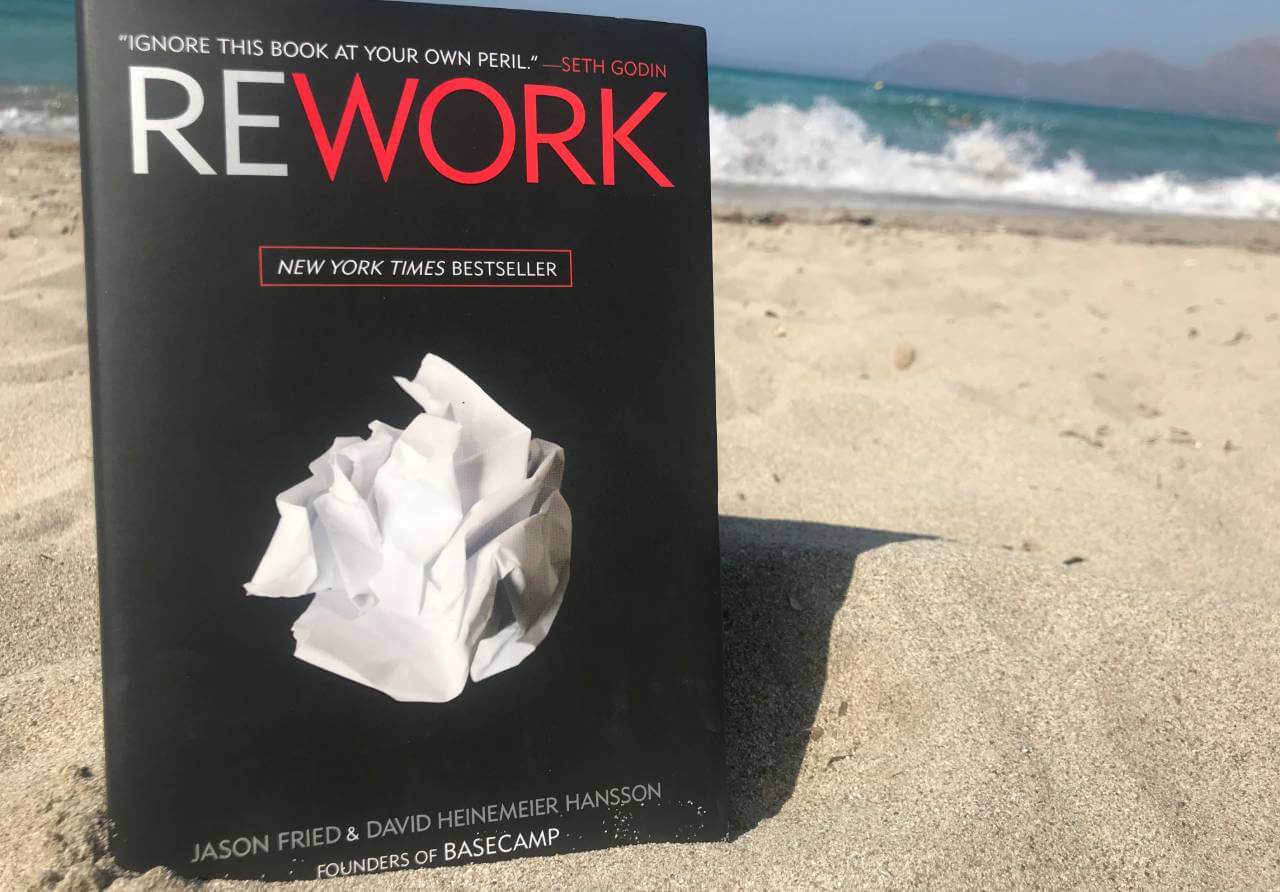tl;dr: Holy shit. THIS. THIS. And thousand times THIS. I love the pragmatism and let's move attitude combined with a provoking writing style. It reminds you how to apply culture and kicks you out of the corporate hamster wheel full of processes and clutter. A book you should read every year. Go, buy, and read it - Rework by David Heinemeier Hansson and Jason Fried!

The problem with [...] copying is it skips understanding - and understanding is how you grow. You have to understand why something works or why sometimes is the way it is.
Jason Fried and David Heinemeier Hansson in REWORK (chapter Don’t copy)
Why did I read this book?
Basecamp (former 37signals) is known for their unique work culture and their pragmatic thinking. I only heard good things about them. They have a high reputation in the engineering community (David invented Ruby on Rails). They have created a small, sustainable, and steady business. They don't want to scale or grow. They seem not to have the goal of being the next unicorn. And this is what I like — the down to earth attitude.
I wanted to know how their pragmatic thinking applies to their work environment, their work culture, and how they use it in their daily business.
What do I like about this book?
Straight and direct
The writing style and language are straight to the point. When Jason and David want to express that this is shit; they write this is shit instead of this can be optimized. I love it because you don't have to guess what they mean or reading between the lines.
Great companies start in garages all the time. Yours can too.
Jason Fried and David Heinemeier Hansson in REWORK (chapter You need less than you think)
Small chapter
Every section is tiny and rarely exceeds three pages. This makes it a quick read, and you can stop and start everywhere. Furthermore, it seems to be a good use for a reference book (even with 90 chapters).
Pragmatic and down to the earth
Basecamp is successful. But they are still pragmatic and down to the earth. They ask the right questions like Why do we need to grow? Only because a startup blog said so? or sentence like Let's replace the fancy-sounding word entrepreneurs with starters.
So let's replace the fancy-sounding word with something a bit more down-to-earth. Instead of entrepreneurs, let's call them starters.
Jason Fried and David Heinemeier Hansson in REWORK (chapter Enough with ‘entrepreneurs’)
Opposite of your best practices
There are a thousand books about best practices on
- how to hire
- how to avoid Public relations disasters
- how to observe your competitors
- how to ensure productivity inside your company with >40 people
Most of them apply a "kind of" process. REWORK is quite the opposite. They get it working: Hire the right people, trust them, and let us move (together).
To be fair: The context is essential; in a >1.000 (enterprise) people company, this is a different story.
What can make this book better in the next edition?
Not so much, to be honest. Maybe something the reader should keep in mind instead of adjusting the book:
Sounds easy
All of their presented styles sound easy and perhaps too obvious. I believe that many people say Yep, that's the style we (need to) run!. I am all in for this. However, you forget it quite often in the real world and need to remind yourself of it. Many of us are trapped in the (corporate) hamster wheel. It might be hard to focus on this with all the clutter and startup articles out there. Maybe to focus on this is already wrong, and you need to establish this as a new habit.
Anyone who takes a "we'll figure out how to profit in the future" attitude to business is being ridiculous. That's like building a rocket ship but starting off by saying, "Let's pretend gravity doesn't exist.". A business without a path to profit isn't a business; it's a hobby.
Jason Fried and David Heinemeier Hansson in REWORK (chapter Start a business, not a startup)
Would I recommend reading this book?
Clear yes.
THIS. THIS. And thousand times THIS. The realistic style that Jason and David describe is the style I believe in. With nearly every page, they hit me. This is a book you should buy on paper, read, put on your shelf, and reread the book every year.
Many of us want to start a product, found a business, and be the next unicorn and get rich. Is this necessary? Or are you mainly driven by the outer media? Two of my ground principles are
- Do awesome things with awesome people and
- Do what you love + have passion for, and the success will come automatic
This book represents those principles by their pragmatic thinking.
When something becomes too polished, it loses its soul. It seems robotic. So talk like you really talk. Reveal things that others are unwilling to discuss. Be upfront about your shortcomings. Show the latest version of what you're working on, even if you're not done yet.
Jason Fried and David Heinemeier Hansson in REWORK (chapter Nobody likes plastic flowers)
I recommend this book to everyone who ...
- wants to be grounded again by a pragmatic work attitude
- feels trapped in growth, process, and we are not moving and needs a new perspective
- is fascinated by small, sustainable businesses and want to know more about the culture at Basecamp
Is there more to read?
Yes, of course:
- The Signal v. Noise blog from Basecamp + friends
- The Basecamp Employee Handbook
- The book It Doesn't Have to Be Crazy at Work by David and Jason
- Ask HN: Companies with a culture similar to Basecamp's?
- Twitter accounts of Jason Fried and David Heinemeier Hansson